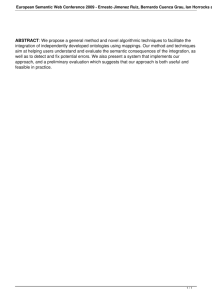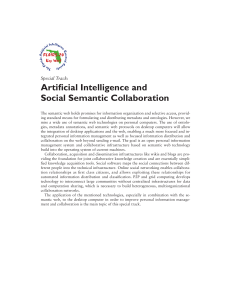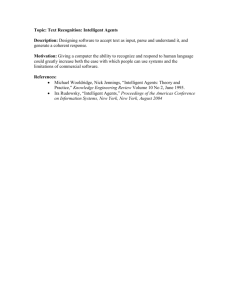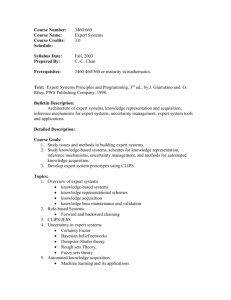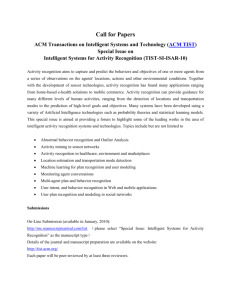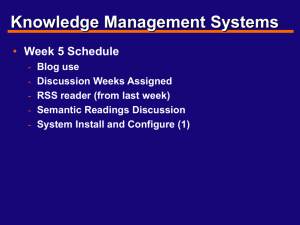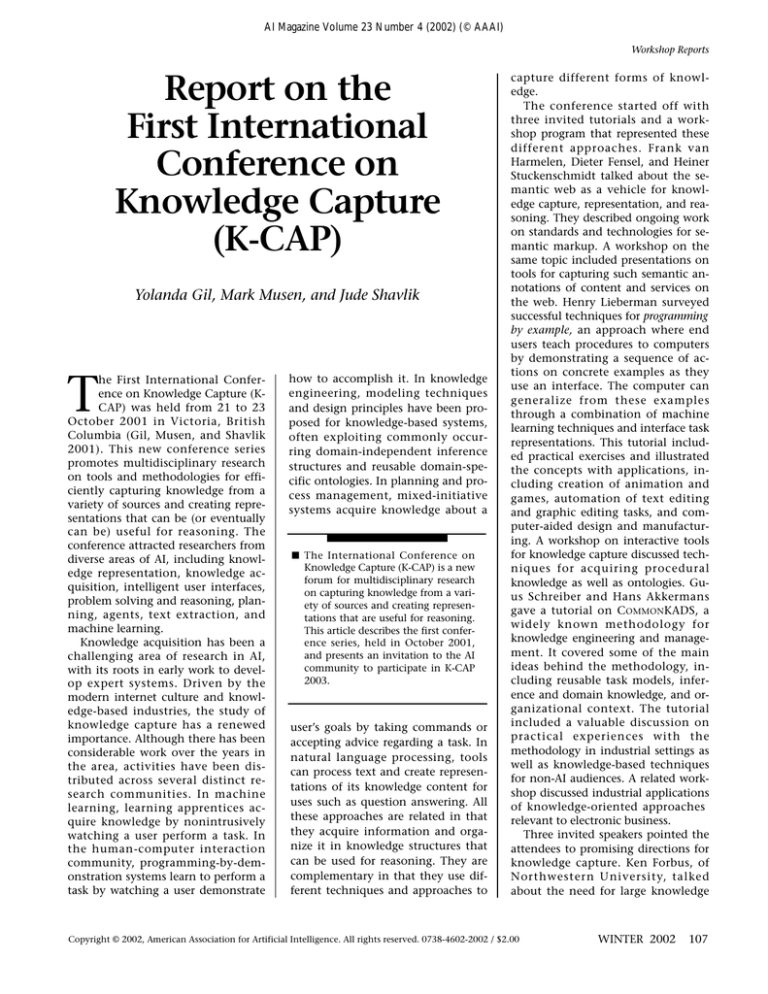
AI Magazine Volume 23 Number 4 (2002) (© AAAI)
Workshop Reports
Report on the
First International
Conference on
Knowledge Capture
(K-CAP)
Yolanda Gil, Mark Musen, and Jude Shavlik
T
he First International Conference on Knowledge Capture (KCAP) was held from 21 to 23
October 2001 in Victoria, British
Columbia (Gil, Musen, and Shavlik
2001). This new conference series
promotes multidisciplinary research
on tools and methodologies for efficiently capturing knowledge from a
variety of sources and creating representations that can be (or eventually
can be) useful for reasoning. The
conference attracted researchers from
diverse areas of AI, including knowledge representation, knowledge acquisition, intelligent user interfaces,
problem solving and reasoning, planning, agents, text extraction, and
machine learning.
Knowledge acquisition has been a
challenging area of research in AI,
with its roots in early work to develop expert systems. Driven by the
modern internet culture and knowledge-based industries, the study of
knowledge capture has a renewed
importance. Although there has been
considerable work over the years in
the area, activities have been distributed across several distinct research communities. In machine
learning, learning apprentices acquire knowledge by nonintrusively
watching a user perform a task. In
the human-computer interaction
community, programming-by-demonstration systems learn to perform a
task by watching a user demonstrate
how to accomplish it. In knowledge
engineering, modeling techniques
and design principles have been proposed for knowledge-based systems,
often exploiting commonly occurring domain-independent inference
structures and reusable domain-specific ontologies. In planning and process management, mixed-initiative
systems acquire knowledge about a
■ The International Conference on
Knowledge Capture (K-CAP) is a new
forum for multidisciplinary research
on capturing knowledge from a variety of sources and creating representations that are useful for reasoning.
This article describes the first conference series, held in October 2001,
and presents an invitation to the AI
community to participate in K-CAP
2003.
user’s goals by taking commands or
accepting advice regarding a task. In
natural language processing, tools
can process text and create representations of its knowledge content for
uses such as question answering. All
these approaches are related in that
they acquire information and organize it in knowledge structures that
can be used for reasoning. They are
complementary in that they use different techniques and approaches to
capture different forms of knowledge.
The conference started off with
three invited tutorials and a workshop program that represented these
different approaches. Frank van
Harmelen, Dieter Fensel, and Heiner
Stuckenschmidt talked about the semantic web as a vehicle for knowledge capture, representation, and reasoning. They described ongoing work
on standards and technologies for semantic markup. A workshop on the
same topic included presentations on
tools for capturing such semantic annotations of content and services on
the web. Henry Lieberman surveyed
successful techniques for programming
by example, an approach where end
users teach procedures to computers
by demonstrating a sequence of actions on concrete examples as they
use an interface. The computer can
generalize from these examples
through a combination of machine
learning techniques and interface task
representations. This tutorial included practical exercises and illustrated
the concepts with applications, including creation of animation and
games, automation of text editing
and graphic editing tasks, and computer-aided design and manufacturing. A workshop on interactive tools
for knowledge capture discussed techniques for acquiring procedural
knowledge as well as ontologies. Guus Schreiber and Hans Akkermans
gave a tutorial on COMMONKADS, a
widely known methodology for
knowledge engineering and management. It covered some of the main
ideas behind the methodology, including reusable task models, inference and domain knowledge, and organizational context. The tutorial
included a valuable discussion on
practical experiences with the
methodology in industrial settings as
well as knowledge-based techniques
for non-AI audiences. A related workshop discussed industrial applications
of knowledge-oriented approaches
relevant to electronic business.
Three invited speakers pointed the
attendees to promising directions for
knowledge capture. Ken Forbus, of
Northwestern University, talked
about the need for large knowledge
Copyright © 2002, American Association for Artificial Intelligence. All rights reserved. 0738-4602-2002 / $2.00
WINTER 2002
107
Conference Reports
bases to build intelligent systems that
have the flexibility and breadth of
human reasoning and discussed analogy and sketching as promising
knowledge capture techniques for
bootstrapping intelligent systems.
Steve Lawrence, of NEC Research Institute, described the design, implementation, and operation of R E SEARCHINDEX (also known as CITESEER),
a digital library of scientific literature
built automatically through text-extraction techniques over the web that
is used daily by many researchers and
institutions. John McCarthy, of Stanford University, discussed the need
for data mining that goes beyond
finding relations among data and instead finds relations between the
phenomena that give rise to the data.
In this phenomenal data mining, relations are established among entities
and facts that arise from those observations in a process that requires
common sense and domain knowledge.
The K-CAP 2001 proceedings are
available online from the ACM Digital Library.1 They include papers on
many important topics for the conference, including ontologies and
knowledge representation, interactive
acquisition tools, collaborative and
distributed knowledge acquisition,
information extraction, knowledge
management, semantic markup, taskoriented knowledge and problem
solving, adaptive user interfaces, and
learning from examples.
The future of knowledge capture is
vibrant and well funded. There is a
large community of researchers and
practitioners interested in the vision
of a semantic web that will contain
annotations that can be used to reason about web content and services.
This vision, initially brought forward
by the World Wide Web consortium,
is motivating many AI researchers to
look at the technology that will enable the expression and capture of
such annotations and is prompting
new challenges for knowledge representation and capture. Funding agencies actively support a wide range of
relevant work on knowledge base development, user-centered planning
and decision aids, agent-based assistants, and knowledge-based machine
108
AI MAGAZINE
learning. The needs and application
of knowledge capture are many and
continue to grow in science, government, and industry. The first edition
of the conference had over 80 attendees from 5 continents. The conference attracted a large number of researchers that traditionally attended
the Banff series of knowledge acquisition workshops that was held from
October 1986 to 1999.
As conference cochairs, we would
like to acknowledge our sponsors and
other people that contributed to the
conference. The Association of Computing Machinery (ACM) provided financial sponsorship and produced
the proceedings. ACM’s SIGART, the
American Association for Artificial Intelligence, and IFIP TC 12 supported
the event. Funding for the conference
was provided by the Air Force Office
of Scientific Research, the Defense
Advanced Research Projects Agency,
the Office of Naval Research, and
STRICOM. John Gennari handled our
finances and coordinated with ACM’s
sponsorship program. Rob Kremer
proposed a wonderful location for
the conference, the relaxing Laurel
Point Inn, and handled the local arrangements together with Tim Menzies. Fensel organized an excellent
workshop program.
The Second International Conference on Knowledge Capture will be
held 23 to 25 October 2003 at Sanibel
Island in Florida. It will be collocated
with the Second International Semantic Web Conference. 2 We look
forward to the future of the knowledge capture conference and its research community.
Note
1. portal.acm.org.
2. A call for papers and other conference
details will be posted at www.k-cap.org.
For any inquiries, please e-mail info@kcap.org.
Reference
Gil, Y.; Musen, M.; and Shavlik, J., eds.
Proceedings of the First International
Conference on Knowledge Capture. New
York: Association of Computing Machinery.
Yolanda Gil is associate
division director for research for the Intelligent
Systems Division at the
Information Sciences Institute and a research assistant professor in the
Computer Science Department at the University of Southern
California. She is principal investigator for
the EXPECT Project, with a research focus
on interactive acquisition tools that help
end users develop and maintain large
knowledge bases, apply them in problemsolving contexts, and exploit knowledge
through the semantic web. She received
her Ph.D. in computer science from
Carnegie Mellon University and her undergraduate degree from the Polytechnic
University of Madrid. She recently
cochaired the new conference on knowledge capture and was program chair of the
2002 conference on intelligent user interfaces.
Mark A. Musen is an associate professor of medicine (medical informatics)
and
computer
science at Stanford University and is head of the
Stanford Medical Informatics Laboratory. He
conducts research related to knowledge
acquisition for intelligent systems, knowledge system architecture, and medical decision support. He has directed the PROTÉGÉ project since its inception in 1986,
emphasizing the use of explicit ontologies
and reusable problem-solving methods to
build robust knowledge-based systems. He
has an M.D. from Brown University and a
Ph.D. from Stanford.
Jude Shavlik is a professor of computer sciences
and of biostatistics and
medical informatics at
the University of Wisconsin at Madison. His research focuses on machine learning, especially
its application to bioinformatics and computer security. He received his Ph.D. in
1988 from the University of Illinois at Urbana/Champaign for his work on explanation-based learning. From 1996 to
1999, he served as editor in chief of the AI
Magazine. Besides helping organize KCAP2001, he was the chair of the 1998 International Conference on Machine Learning, was the cochair of the 1993
International Conference on Intelligent
Systems for Molecular Biology, and is the
conference chair of the 2003 IEEE DataMining Conference.

